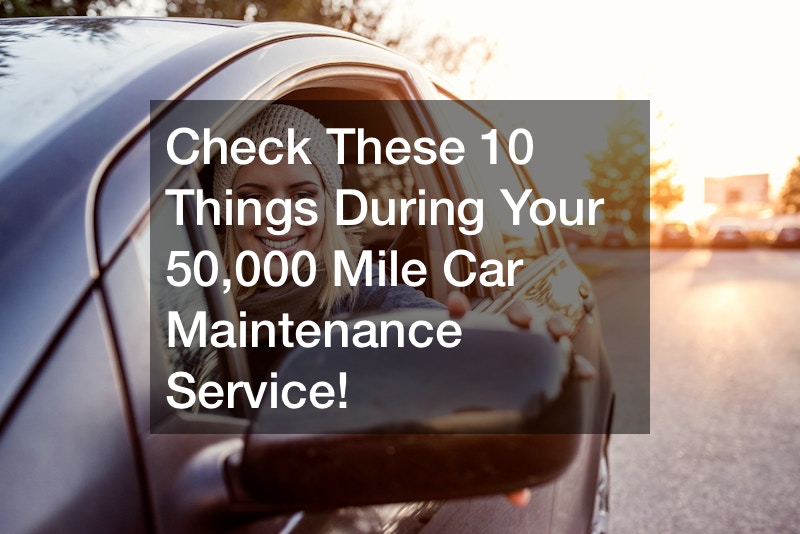
Routine vehicle importance is vital for improving your car’s performance, efficiency, and safety. It also helps save you money by reducing malfunctions and breakdowns. This is why vehicle maintenance services by mileage are recommended to ensure your car runs perfectly.
One of the most important milestones for your car’s life is the 50,000-mile mark. At this stage, the vehicle requires several services to ensure it is in perfect condition and extend its lifespan. If you’re taking your vehicle for a tune-up, below are the top items to check during the 50000 mile car maintenance visit.
1. Oil Change
An oil change is one of the top services you should get during a 50000 mile car maintenance appointment. Most mechanics recommend changing the oil after every 3,000 to 5,000 miles, so you’ll likely need to change it again by the time you reach the 50,000-mile mark.
While it might seem vital, an oil change is critical for the smooth running of your car. The oil lubricates the engine’s moving parts, reducing friction. It’s also essential in preventing rust and corrosion and cooling the engine. Therefore, failing to change your oil regularly will likely lead to a breakdown, necessitating a call to a towing service.
So, to avoid any problems on the road, you should ensure you get regular oil changes, including during the 50,000-mile mark. Additionally, you should change your oil filters, which will help protect your engine from contaminants captured by the oil. Lastly, having the mechanic check your coolant is also a good idea. While some cars come with life-long coolants and antifreeze, you should have it inspected at the 50,000-mile mark to ensure it works properly.

2. The Vehicle’s Body
When most people take their cars for servicing, they usually expect an inspection of components such as engines, brakes, transmissions, etc. However, the body panel is just as important – it can impact your car’s aesthetic appeal, safety, and structural integrity. Therefore, a body inspection is another critical service you should get during the 50000 mile car maintenance schedule.
The paint is one of the top areas to consider during your vehicle’s body inspection. Unfortunately, at the 50,000-mile mark, your car’s body paint may have been damaged from scratches, sun exposure, bird droppings, acid rain, road salt, etc. Fortunately, your local auto body shop can make your car look new again with a paint job.
Besides cosmetic damage, your car’s body panel may require repairs and maintenance due to dents, dings, rust, and corrosion. You might also need to replace body panel parts, for example, the doors, bumper, and trunk, especially after a severe collision. Fortunately, you can sell some of the removed parts for scrap metal recycling, giving you some additional money to cover the cost of the new parts.
3. The Vehicle’s Filters
Besides the oil filter, there are other types of filters in a car that capture impurities and contaminants. You should change these filters regularly before they become too clogged, which can cause several problems for your vehicle. Therefore, filter replacement is another item to cross off your checklist during the 50000 mile car maintenance appointment.
The engine air filter is one of the top filters you should have replaced at the 50,000-mile mark. It’s a vital component that prevents dust, debris, sand, insects, small particles, and other contaminants from entering your engine, guaranteeing its smooth running. Therefore, changing it can prevent engine damage and offer many other benefits, such as a clean exhaust, improved performance, and better fuel efficiency.
The other two critical filters you should change regularly are the fuel and cabin filters. The fuel filter removes impurities in the fuel, preventing them from entering the fuel injectors. This helps protect the injectors and the engine from damage while maintaining your vehicle’s performance. On the other hand, the cabin filter removes airborne contaminants, ensuring that the air entering your car’s cabin is clean and safe to breathe.

4. The Engine
According to Consumer Reports, modern cars can last up to 200,000 miles or more without needing major repairs in areas such as the engine. Therefore, it’s unlikely that your engine will have an issue by the time you reach the 50,000-mile mark.
However, it is essential to have it inspected for peace of mind or if you have not been keeping up with maintenance like oil and filter changes. You may also need to schedule an inspection for your vehicle’s engine if you have been involved in an accident, recently purchased the car, or if the check engine light is on.
During the engine inspection, your mechanic will closely examine all the parts to ensure they work correctly. These include the air and fuel intake system, mechanical components, emission control components, lubrication system, belts, hoses, gaskets, seals, etc. These inspections can help detect issues early on, protecting you from costly repairs or purchasing a new engine.
If any issues are detected during the inspection, you must replace the defective parts immediately. You can use new components from the manufacturer, or purchase used auto parts that are still in perfect condition for the replacements.
5. The Brake System
According to a study published on ScienceDirect, brake failure is one of the leading causes of car crashes. Unfortunately, such collisions are often severe, resulting in serious injuries or deaths. Therefore, a brake inspection is another vital service you should get during the 50000 mile car maintenance appointment.
Brake inspection is intensive and involves examining all the brake system parts. These include brake pads, rotors, discs, springs, washers, braking plates and shoes, drum brakes, etc. In addition, if your car uses an air brake system, you’ll need additional inspections for components such as the air brake valves and hoses.
After a brake inspection, you may need to replace components if there are any signs of damage (cracking) or distortion. Additionally, regular replacements are required for parts prone to wear and tear – for example, brake pads and rotors.
Lastly, you should have your brake fluid checked and replaced if necessary. The recommended interval for changing the brake fluid varies between different car manufacturers. However, it’s a good idea to change the fluid every few years or if you notice any braking issues such as strange noises and smells, poor braking, or a soft brake pedal.

6. The Transmission System
A vehicle’s transmission can last up to 200,000 miles, so it is rare to experience problems before reaching the 100,000 miles mark. However, checking the transmission system during the 50000 mile car maintenance schedule is an excellent idea. This is especially the case if you haven’t kept up with regular maintenance. The inspection may also be necessary if you recently bought your vehicle from a cars for cash dealer and are concerned about the maintenance history.
During the transmission inspection, you can expect a physical examination of your car’s transmission system. This helps to identify any issues, such as a fluid leak or damage to the transmission components. Some auto shops use diagnostic technology to detect and identify problems plaguing your transmission system. In addition, your mechanic might do a road test to get a better feel of how you’re the system is responding to a driver’s input.
Any issues identified during the inspection will need to be repaired to avoid costly breakdowns or, worse, compromising the safety of your cars. Additionally, your vehicle’s transmission may require minor tune-ups to ensure the system runs smoothly. These tune-ups include flushing and replacing and changing the transmission fluid filters.

7. The Tires and Wheels
Worn-out car tires are one of the leading causes of accidents, as they are prone to issues such as blowouts, loss of air pressure, poor traction, etc. However, getting new tires can also improve performance and gas mileage. Therefore, it is essential to change your tires regularly to keep your car in perfect condition.
Experts recommend changing the tires after around every 20,000 to 40,000 miles or more, depending on factors such as type of tires, vehicle, driving style, etc. Therefore, you’ll likely need new tires during the 50000 mile car maintenance visit.
However, even if the tires have yet to reach the 50,000 mileage, you should still consider changing them if they are older than five to six years. This is especially true with trailer tire and wheels, which are prone to blowouts once they age. Changing the tires is also essential if the car has been idle for a long time.
Lastly, during a 50000 mile car maintenance appointment, you should consider other services such as tire rotation and air pressure check. Getting a wheel alignment is also a good idea, especially if you usually drive on bumpy roads or rough terrain.
8. The Windshields and Windows
Windshields play a vital role in vehicles. They protect passengers and the car’s interior from the elements. They also give the driver a clear vision of the road, thus promoting safety. Lastly, windshields can absorb impact (for example, from airbags), thus adding to the vehicle’s safety. Therefore, windshield inspection is another vital service you should get when taking your car in for service at the 50,000-mile mark.
During the windshield inspection, your mechanic should check for any signs of damage, for example, cracks, chips, loose seals, or broken glass on both from and rear windshields. If any damage is identified, you should have it repaired immediately – which will prevent the damage from spreading. However, you may have to consider a broken windshield replacement if the damage is too extensive.
Besides the windshields, your mechanic should also check that your car’s wipers are in perfect condition, and if not, replace them. On top of that, they should inspect your vehicle’s windows for any signs of damage and repair or replace any defective glass.
9. The Suspension System
The suspension system is another vital component in your car. It helps to maintain perfect contact and friction between the tires and the road, thus improving vehicle handling. It is also essential for keeping the passengers comfortable and maintaining the structural stability of the vehicle. Therefore, suspension inspection is another top service you should schedule during the 50000 mile car maintenance appointment.
You can also take your car to the auto shop for inspection if you suspect any signs of suspension issues, for example, bumpy driving, trouble steering, drifting in one direction, etc. However, you should avoid driving your car if there are clear signs of suspension damage. Instead, you should hire a car hauler or a flatbed towing service to take your vehicle to the auto shop.
During a suspension inspection, your mechanic will visually examine your vehicle for any signs of suspension problems. These include damage to the struts, shock absorbers, ball joints, stabilizer bars, etc. If there is any damage, you should immediately have the defective components repaired or replaced, ensuring the problem does not spread.
10. Battery and the Electrical System
Dead batteries are one of the top problems that most car owners experience. Unfortunately, a faulty battery can sometimes leave you stranded in unsafe locations unless you call for roadside assistance. Therefore, you should regularly check and replace your car battery if necessary.
Most car batteries can last for around four years, which can give you, on average, about 40,000 to 55,000 miles. Therefore, if you have yet to replace your battery, you should schedule for it to be checked during your 50000 mile car maintenance appointment. If the battery is faulty, you can have it repaired – depending on the type of the battery and its condition. Alternatively, you can replace it with a new one, saving you many hassles.
Besides the battery, you should also have your mechanic check on other electrical components of the vehicle. These include spark plugs, the ignition, alternator, lights, dashboard sensors and gauges, wiper motor, window heater, door locking system, electric windows, etc.
Regular vehicle maintenance can keep it running smoothly and ensure safety and comfort when you’re on the road. It can also prevent costly and inconvenient breakdowns. If you’re planning a 50000 mile car maintenance visit, the above are some of the top items your mechanic should check on to ensure your car is in perfect condition.



